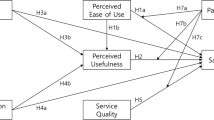Abstract
Enterprises are investing a great amount to utilize information systems. These investments are expected to increase worker productivity and thus bring forth a considerable amount of profit to the enterprise. Given this situation, there are many studies being conducted on the relation between IT investment and an increase in individual productivity. This study deals with more general enterprise information systems, and has the objective of developing a model to assess the user’s utilization of the enterprise information systems. Using the User competency evaluation model as the basis, the assessment model uses User’s EIS basic knowledge, general application, master application, personality as the measurement areas, and utilizes a different measurement method for the different categories taking into account the characteristics of each category. Also, in order to test the validity and credibility of the assessment model, we applied a case among approximately 18,000 female employees of Korea’s representative automobile companies. As a result, all of the measured categories with the exception of User’s EIS Personality were proven to be valid and credible. The User’s EIS Personality is an index that is more prone to be affected by the individual characteristics of the user, and thus requires further research.
This work has been supported by Yonsei University Institute of “u-City Research Institute (uCRI)”, a Brain Korea 21 program, Korea.
Preview
Unable to display preview. Download preview PDF.
Similar content being viewed by others
References
Jain, V., Kanungo, S.: Impact of Nature of Information systems Use in Information System-Enabled Productivity. International Journal of Human-Computers Interaction 19(1), 113–136 (2005)
Rosenthal, B.E.: Managing end user computing. Banking Software Review 15(5), 28–33 (1990)
Stewart, T.: Intellectual capital. Doubleday, New York (1997)
Goodhue, D.L., Thompson, R.L.: Task-Technology Fit and Individual Performance. MIS Quarterly 19(2), 213–236 (1995)
Torkzadeh, G., Doll, W.J.: The Development of a Tool for Measuring the Perceived Impact of Information Technology on Work. Omega 27(3), 327–339 (1999)
Compeau, D.R., Higgins, C.A.: Computer self-efficacy: Development of a measure and initial test. MIS Quarterly 19, 189–211 (1995)
Davis, F.D.: Perceived usefulness, perceived ease of use, and user acceptance of information technology. MIS Quarterly 13, 319–339 (1989)
Davis, F.D., Bagozzi, R.P., Warshaw, P.R.: User acceptance of computer technology: A comparison of two theoretical models. Management Science 35, 982–1003 (1989)
Mathieson, K.: Predicting user intentions: Comparing the technology acceptance model with the theory of planned behavior. Information Systems Research 2, 173–222 (1991)
Moore, G.C., Benbasat, I.: Development of an instrument to measure the perceptions of adopting an information technology innovation. Information Systems Research 2, 192–222 (1991)
Thompson, R.L., Higgins, C.A., Howell, J.M.: Personal computing: Toward a conceptual model of utilization. MIS Quarterly 15, 125–143 (1991)
Sowray, D.M.: Designing information systems for maximum use in a dealing room environment. BEHAVIOUR & Information Technology 17(4), 203–217 (1998)
Scholtz, J.: Metrics for evaluating human information, interaction systems. Interacting with Computers 18, 507–527 (2006)
Shi, W., Yang, B., Li, Q.: An object-oriented data model for complex objects in three-dimensional geographical information systems. International Journal of Geographical Information Science 17(5), 411–430 (2003)
McClelland, D.C.: Testing for Competency rather than for Intelligence. American Psychologist 28, 1–14 (1973)
Hwang, G.T.: Re-Lighting Competency concept for Human Resource Systems, sungkyungkwan University Management Research Center (2000)
Yoon, C.Y.: A study on Development of an Integrated Evaluation Systems for Personal Informatization and Maturity Level Measurement. Computer & Industrial Engineering, YONSEI University (2003)
Lucia, A.D., Lepsinger, R.: The Art & Science of Competency Models: Pinpointing Critical Success Factors in Organizations. HR Magazine 45(1), 140–141 (2000)
Yun, Y.S: Developing Competency-Based Curriculum in Enterprise Education: Cases of Motorola University and LG Electronics. Enterprise Education Research Center 1(1), 103–123 (1998)
O’Driscoll, M.P., Eubanks James, L.: Behavioral Competencies, Goal Setting, and OD Practitioner Effectiveness. Group & Organization Management 18(3), 308–327 (1993)
McCoy, R.W.: Computer Competencies for The 21st Century Information Systems Education. Information Technology, Learning, and Performance Journal 19(2), Fall (2001)
Jenkins, W.E., McHarg, E.: Developing professional excellence, Professional Safety, pp. 17–20 (June 1988)
Westbrook, B.W.: The Relationship between Career Choice Attitudes and Career Choice Competencies of Black 9th-Grade Pupils. Educational and Psychological Measurement 52, 347–351 (1992)
Rifkin, K.I., Fineman, M., Ruhnke, C.H.: Developing Technical Managers-Fist You Need a Competency Model, Research & Technology Management, pp.53–57, Industrial Research Institute, Inc. (March-April 1999)
Yu, E.J., Leem, C.S., Park, S.K., Kim, B.W.: An Integrated Evaluation System for Personal Informatization Levels and Their Maturity Measuement: Korean Motors Company Case, In: International Conference on Control, Automation and Systems 2005, pp. 1306 – 1315 (2005)
chai, S.i.: Social science research method, Hacyounsam (2001)
Kang, B.S.: Research Method for Factor analysis, MooYuckkyoungyoungsa (1999)
Author information
Authors and Affiliations
Editor information
Rights and permissions
Copyright information
© 2007 Springer-Verlag Berlin Heidelberg
About this paper
Cite this paper
Yu, E.J., Choi, Y., Leem, C.S. (2007). A User-Oriented Assessment of Enterprise Information Systems . In: Jacko, J.A. (eds) Human-Computer Interaction. HCI Applications and Services. HCI 2007. Lecture Notes in Computer Science, vol 4553. Springer, Berlin, Heidelberg. https://doi.org/10.1007/978-3-540-73111-5_92
Download citation
DOI: https://doi.org/10.1007/978-3-540-73111-5_92
Publisher Name: Springer, Berlin, Heidelberg
Print ISBN: 978-3-540-73109-2
Online ISBN: 978-3-540-73111-5
eBook Packages: Computer ScienceComputer Science (R0)




